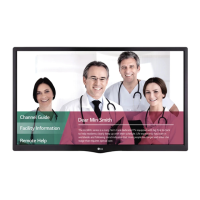8
206-4342
When the TV CPU is configured with an FTG Channel Map, the CPU controls and restricts the tuning
operation of the TV, and when the EBL is configured with an FTG Channel Map, the EBL controls and
restricts the tuning operation of the TV. In these models, FTG Mode via CPU also provides the option to
select either logical or physical tuning (see note below) during configuration. You must determine which
element of the TV will own the FTG Channel Map before you can begin configuration.
Note: Logical channel mapping of physical RF channels eliminates dash tuning; for example, physical 19-3
can be mapped to logical channel 9. It also allows physical RF channels and Aux inputs to be listed in any
order, not only in physical numeric ascending order. Physical channel tuning requires that you include the
dash when direct entering RF channel numbers and Aux inputs (the latter designated by 130-0 through 137-0).
FTG Mode via CPU
This mode provides the following features:
• Logical or physical channel tuning of physical RF
channels and Aux inputs.
• Mapping of RF channels with minor (program) numbers
up to 999.
• FTG Channel Map of up to 600 channels.
• Start Channel set for RF or Aux input delivered content.
• Pro:Centric data delivery over RF.
• TV Zoning (including channel restrictions by Zone)
option for location-specic congurations.
LG’s Cloud Conguration Tool enables you to create
an FTG Conguration (.tlx) le, which may be used to
congure the CPU for FTG Mode. You can also create a
Clone (.tlx) le from a Master TV Setup that may be used
to congure the CPU for FTG Mode.
Note: The TV Zoning feature is supported via “.tlx” le.
See Reference section, “Using the TV Zoning Feature,”
for further information.
In this mode, the CPU is the owner of the FTG Channel
Map and must be congured with an FTG Channel Map
and FTG Installer Menu settings using one of the following
processes:
• Local: Congure an individual LT572M TV via its USB
port using a USB memory device / “.tlx” le. The le
may be either a Clone le (see Cloning Procedures” on
pages 50 to 55) or an FTG Conguration le (see “Cloud
Conguration Tool Overview” on pages 56 to 62).
• Remote: Congure all LT572M TVs at the site using
a Pro:Centric server head end device (Example:
PCS400R). Refer to the Pro:Centric Server Admin
Client User Guide for further information.
FTG Mode via EBL
This mode provides the following features:
• Logical channel tuning of physical RF channels and
Aux inputs.
• Mapping of RF channels with minor (program) numbers
up to 255.
• FTG Channel Map of up to 141 logical channels.
• Start Channel set for RF or Aux input delivered content.
• Pro:Centric data delivery over RF.
LG’s FTG Device Conguration Application PC software
is required to congure the EBL. In this mode, the EBL
is the owner of the FTG Channel Map and must be
congured with an FTG Channel Map and FTG Installer
Menu settings using one of the following processes:
Note: In order to create an FMA Conguration (.fma)
le for these models that can be used for remote
management of FTG Installer Menu settings, you will
need to “Read” FTG Installer Menu settings from a
Master TV. See Reference section, “FTG Mode via EBL
(Local Conguration),” for further information.
• Local: Congure an individual LT572M TV’s EBL
via its TV-LINK CFG jack using a direct PC-to-TV
(EBL) connection and the FTG Device Conguration
Application. See Reference section, “FTG Mode via
EBL (Local Conguration),” for information on the
“Write” process for an FTG Channel Map and FTG
Installer Menu settings.
• Remote: Congure all LT572M TV EBLs at the site
using a Free-To-Guest Management Appliance (FMA)
head end device (Example: FMA-LG102). Refer to
the Free-To-Guest (FTG) Device Configuration
Application User Guide and/or the Installation &
Conguration Guide for the FMA device for further
information.
Commercial Mode Overview (Cont.)

